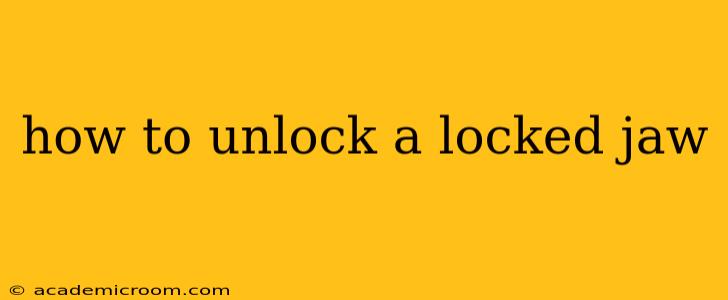A "locked jaw," medically referred to as temporomandibular joint (TMJ) disorder or dysfunction (TMD), is a painful and debilitating condition affecting the jaw joint and surrounding muscles. It can range from mild discomfort to severe locking, making it difficult or impossible to open or close your mouth fully. This comprehensive guide will explore the causes, symptoms, and most importantly, how to unlock a locked jaw, emphasizing both immediate relief and long-term management strategies.
What Causes a Locked Jaw?
Several factors can contribute to a locked jaw or TMJ disorder. Understanding the underlying cause is crucial for effective treatment. These include:
- Injury: Trauma to the jaw, such as a blow to the face or a dislocated jaw, can directly damage the TMJ.
- Arthritis: Osteoarthritis or rheumatoid arthritis can inflame and damage the joint, leading to stiffness and limited movement.
- Muscle Disorders: Problems with the muscles controlling jaw movement, often stemming from stress, bruxism (teeth grinding), or clenching, contribute significantly to TMD.
- Genetic Predisposition: Some individuals may be genetically predisposed to developing TMJ disorders.
- Dental Issues: Misaligned teeth, poorly fitted dental work, or even wisdom teeth can put stress on the jaw joint.
What are the Symptoms of a Locked Jaw?
The symptoms of a locked jaw can vary widely in severity and presentation. Some common signs include:
- Jaw Pain: Pain in the jaw joint, often accompanied by tenderness to the touch.
- Limited Jaw Movement: Difficulty opening or closing your mouth fully. This can range from slight stiffness to complete locking.
- Clicking or Popping Sounds: Noticing clicking or popping sounds in the jaw joint when opening or closing your mouth.
- Headaches: Frequent headaches, especially in the temples or around the ears.
- Earaches: Pain in the ear, often mistaken for an ear infection.
- Facial Pain: Pain or discomfort in the face, particularly around the jawline.
How to Unlock a Locked Jaw: Immediate Relief Techniques
If your jaw is locked, these immediate steps might provide some relief, but they're not a replacement for professional medical advice.
- Gentle Jaw Movements: Try gently opening and closing your mouth, moving your jaw from side to side. Do this only if it doesn't cause significant pain. Pushing too hard can worsen the situation.
- Heat or Cold Packs: Apply a warm or cold compress to the affected area for 15-20 minutes at a time. Experiment to see which provides more relief.
- Over-the-Counter Pain Relief: Nonsteroidal anti-inflammatory drugs (NSAIDs) like ibuprofen or naproxen can help manage pain and inflammation. Always follow the dosage instructions on the label.
- Relaxation Techniques: Stress and tension can exacerbate TMJ disorders. Practicing relaxation techniques such as deep breathing or meditation can help.
Important Note: If your jaw is severely locked, you are experiencing intense pain, or if home remedies don't provide relief within a few days, seek immediate medical attention.
How Long Does a Locked Jaw Last?
The duration of a locked jaw varies greatly depending on the cause and severity of the condition. In some cases, it might resolve spontaneously within a few days, while others may require weeks or even months of treatment.
What are the Long-Term Treatment Options for a Locked Jaw?
Long-term management of TMJ disorders typically involves a combination of approaches:
- Physical Therapy: A physical therapist can teach you exercises to strengthen and stretch the jaw muscles, improving range of motion and reducing pain.
- Splints or Mouthguards: Custom-made splints or mouthguards can help realign the jaw and reduce stress on the joint.
- Medications: Your doctor might prescribe stronger pain relievers or muscle relaxants if needed.
- Injections: Corticosteroid injections can help reduce inflammation in the joint.
- Surgery: Surgery is usually considered only as a last resort for severe cases that don't respond to other treatments.
Can a Chiropractor Help with a Locked Jaw?
Some chiropractors offer treatments for TMJ disorders, focusing on adjustments to the jaw and neck. However, it's essential to choose a chiropractor with specific experience in treating TMJ.
What are the Home Remedies for a Locked Jaw?
Home remedies can offer temporary relief but should not replace professional medical care. These include gentle jaw exercises, applying heat or cold packs, and using over-the-counter pain relievers.
When Should I See a Doctor About a Locked Jaw?
You should seek medical attention if:
- Your jaw is severely locked.
- You experience significant pain.
- Home remedies don't provide relief.
- You have difficulty eating or speaking.
- Your symptoms persist for more than a few days.
This information is for general knowledge and does not constitute medical advice. Always consult with a healthcare professional for diagnosis and treatment of any medical condition.
